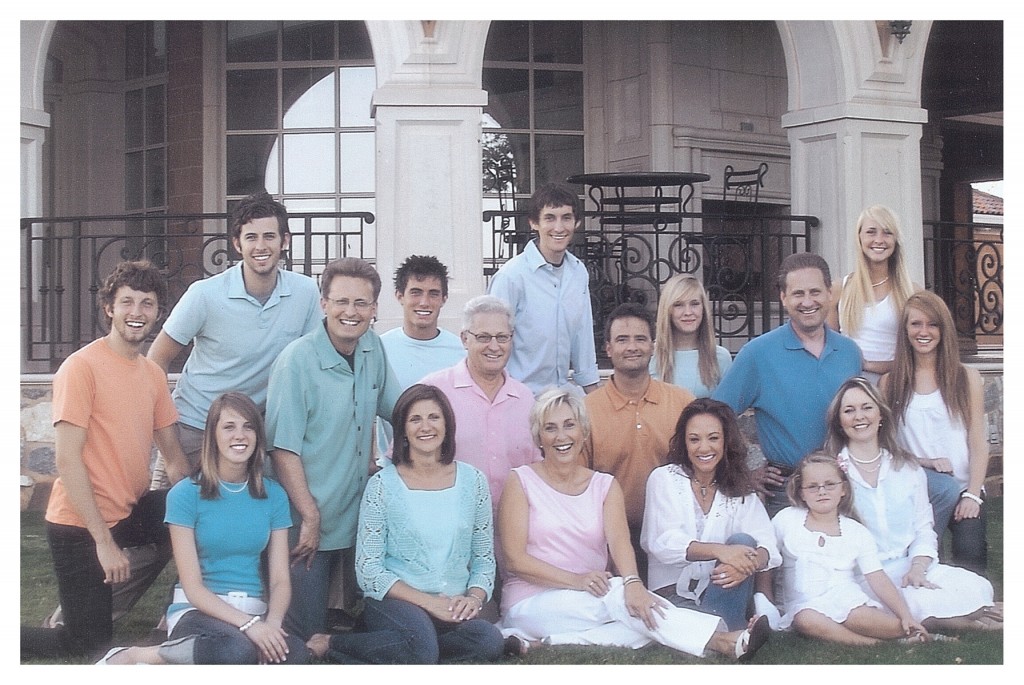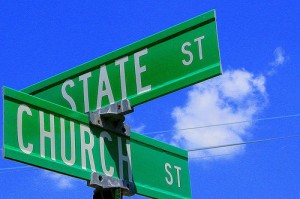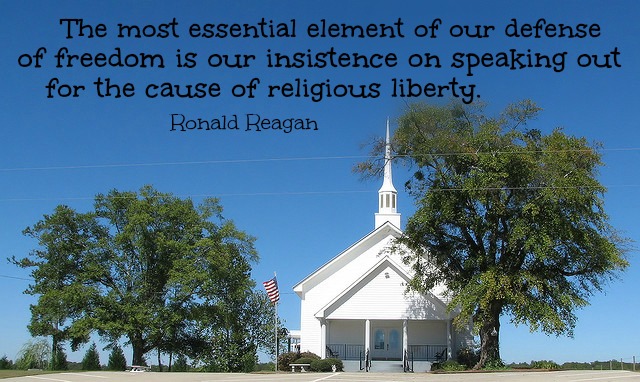How Will the Hobby Lobby Ruling Affect Latter-day Saints?
The U.S. Supreme Court’s Hobby Lobby ruling is still making waves in America’s political system. In a divided 5-4 decision, the majority of justices said:
[quote_box_center]As applied to closely held corporations, the regulations promulgated by the Department of Health and Human Services requiring employers to provide their female employees with no-cost access to contraception violate the Religious Freedom Restoration Act.[/quote_box_center]
Democrats tried but failed to pass a bill overturning the verdict. Senate Majority Leader Harry Reid voted against the bill but said they plan to reintroduce it later this year. Republicans are also working on a bill to answer Democrats’ political attacks. Although it appears that most Americans and commentators disagree with this ruling, the reason they do is simple: Religion and the free expression of it are becoming second-class citizens in our country today.
Lawmakers and other commentators are saying the ruling denies women certain coverage for contraceptives. But that’s not the point of this ruling at all. Republican Senator Kelly Ayotte of New Hampshire said of her bill:
It’s important that American women understand that you can be for supporting people’s religious freedom and also support women’s access to contraception.
These two concepts aren’t mutually exclusive. One person’s right to think, believe and act according to his or her deeply held beliefs doesn’t negate another’s right to certain contraceptives.
The point of the Supreme Court ruling is this: Business owners don’t give up their right to religious freedom when they open their doors to the public. Within a limited scope, they can exercise their rights by not supporting certain contraceptives they object to on religious grounds.
It’s important to remember that behind the hoopla and the headlines are religious people who are trying to follow the dictates of their own conscience and run a business at the same time. This is what religious freedom is all about. It’s one thing to say we believe it, but it’s another thing to act on and defend this liberty.
The U.S. Supreme Court’s ruling in the Hobby Lobby case is a victory for religious freedom. And that’s what the Hobby Lobby ruling means to members of The Church of Jesus Christ of Latter-day Saints. We can more fully appreciate the decision handed down in this case as we study what religious freedom means to Hobby Lobby’s owners and their lawyers, to America as a nation and to us personally.
Hobby Lobby Owners—Business People Who are Christians First

David Green, founder and CEO of the arts and crafts retail chain with his wife, Barbara, started a miniature picture frame business in the garage of their home in 1970. Hobby Lobby Stores, Inc. is an extension of that business, opening its first retail space in 1972. The retail chain is still a family owned company. From the beginning, the owners decided they would honor the Lord by “operating the company in a manner consistent with biblical principles.”
This includes not opening the stores on Sunday to honor the Sabbath day and keep it holy (see Exodus 20:8-11) as well as allowing employees to spend that day with their families. The Greens have strived to “apply the Christian teachings of respect and fairness” in the way they treat their employees and in all aspects of their business. Indeed, the Green family states:
We believe that it is by God’s grace and provision that Hobby Lobby has endured. He has been faithful in the past, and we trust Him for our future.
These are the people who are trying to follow their beliefs in all things. The Greens believe that life begins at conception, when an egg is fertilized. So they don’t support drugs and devices that terminate the life of unborn children. When the government instituted regulations that required the company to provide insurance coverage for 4 life-threatening drugs and devices or pay fines, they stood up in defense of their religious convictions.
The Greens took no issue with 16 of the 20 contraceptives required—just the 4 abortifacient ones. So when commentators and lawmakers say that Hobby Lobby wants to deny contraceptive coverage to their female employees, this really isn’t true. They don’t want to provide abortion-inducing drugs and devices to their employees on moral and religious grounds. That’s all they asked for—and that’s what they were granted.
All the media hoopla and political grandstanding ignore the simple facts of this case: Hobby Lobby owners are business people who are Christians first. They have operated their company on this premise from the beginning. All they asked is to be able to continue to do so.
The Becket Fund: Lawyers Who Fight for Religious Freedom
The Becket Fund for Religious Freedom is a nonprofit firm based in Washington, D.C. As the name implies, the law firm “looks specifically for opportunities to represent believers of all faiths … who see their freedom to live their faith in jeopardy, with an eye toward not just protecting individuals, but also changing the law and the debate on issues of religious liberty.”
This is an important—and needed—course of action in our day. The Becket Fund seeks out cases that set precedent and advance the cause of religious freedom. Kevin J “Seamus” Hasson, Becket Fund founder who is now president emeritus, said the goal is to give “people the freedom to follow the dictates of their own conscience and exercise their faith, as long as it doesn’t threaten public health, safety or morals, is critical for a pluralistic society to peacefully function.”
William P. Mumma, current president and chairman of the board of the nonprofit law firm, said:
The mission of the Becket Fund is to shape the law, so that the broadest possible base of support for religious liberty can be generated by the American people and embodied in American law and court decisions.
The Becket Fund understands the importance of religion in society—of all religions. Nathan J. Diament, executive public policy director for the Union of Orthodox Jewish Congregations of America, said:
[quote_box_center]The Becket Fund engages in cases that affect Jews and Christians and Muslims and many other people of many other faiths. They help portray, very vividly, that religious liberty is something that everyone has a stake in, even if it’s not a person of their particular religion.[/quote_box_center]
I think because religion is so entrenched in our society today, we have begun to take it for granted. But unless and until we truly understand its impact, we won’t truly appreciate those who fight for this freedom.
Religion in a Free Society

The freedom of religious expression is the foundation of a free society. Our Founding Fathers clearly understood the role that religion plays in a society governed by the people. John Adams, one of the Framers of our Constitution, said (John Adams, The Works of John Adams, Second President of the United States, Charles F. Adams, 1854.):
We have no government armed with power capable of contending with human passions unbridled by morality and religion.
James Madison, often called the Father of the U.S. Constitution, said (Russ Walton, Biblical Principles of Importance to Godly Christians, New Hampshire: Plymouth Foundation, 1984, p. 361.):
We have staked the whole future of American civilization not upon the power of the government—far from it. We have staked the future of all of our political institutions upon the capacity of each and all of us to govern ourselves according to the Ten Commandments of God.
The Fathers of our nation knew that for a free society to be truly free, the citizens must be controlled from within, and not from external controls. In other words, the people must be willing to obey the laws because they are laws—not because they fear arrest or retribution. Walter Williams wrote:
[quote_box_center]Policemen and laws can never replace customs, traditions and moral values as a means of regulating human behavior. At best, the police and criminal justice system are the last desperate line of defense for a civilized society. Our increased reliance on laws to regulate behavior is a measure of how uncivilized we’ve become.[/quote_box_center]
Indeed, as Elder D. Todd Christofferson, a member of the Quorum of the Twelve Apostles (with the First Presidency, the governing body of The Church of Jesus Christ), said:
“There could never be enough rules so finely crafted as to anticipate and cover every situation, and even if there were, enforcement would be impossibly expensive and burdensome. This approach leads to diminished freedom for everyone. In the memorable phrase of Bishop Fulton J. Sheen, ‘We would not accept the yoke of Christ; so now we must tremble at the yoke of Caesar.’”
Religious teachings help to instill the internal controls that guide our behavior. In turn, civilized citizens keep the rule of law because it’s the right thing to do, leading to a peaceful and prosperous society.
In contrast, democracies don’t work well in societies where religion isn’t valued. Clayton Christensen, a Latter-day Saint who is also a professor at the Harvard Business School, recounted a conversation with a Marxist economist from China. This colleague saw a correlation between the success of democracy in other countries with the value they placed on religious teachings. Christensen said:
[quote_box_center]Unless there was already a strong religious foundation in those countries, [my friend] asserted, democracy has failed miserably. There are religions in every country, of course. But he made clear that democracy-enabling religions are those that support the sanctity of life, the equality of people, the importance of respecting others’ property, and of personal honesty and integrity. Those religions also had to be strong enough that they held power over the behavior of the population. People had to believe that God would punish them even if the police and court system did not. He then gave some examples.
In Russia, for instance, there are religions—but few people are influenced by them. As a result many people avoid taxes, and the government cannot collect them. Murder, bribery and stealing are a part of everyday life.[/quote_box_center]
We are still influenced by religion in America today, where people obey laws because it’s the right thing to do. The Founding Fathers were inspired to create a form of government where religions flourished independent of government. We bring our religious convictions to the public square by the way we live our lives. It is our inner desire to do what’s right and obey the laws of the land that allows us to be free—not the laws themselves.
Religion in the Business World
Religion—and the lack of it in society—also play a large role in the business world. The same beliefs and inner controls that guide our behavior in the world also direct our attitudes and behavior in business. The recent housing crash is an excellent example of what the lack of morals and ethics can do. Elder Christofferson said:
[The] devastating economic recession … was brought on by multiple causes, but one of the major causes was widespread dishonest and unethical conduct, particularly in the U.S. housing and financial markets.
On the flip side, our moral and ethical behavior can have a positive impact on businesses. Recently I was visiting family in Arizona, and my sister and I went into a convenience store. My sister handed the clerk a $10 bill but received change for a $20 bill. Immediately my sister said, “You gave me too much money. I only gave you a ten.” The cashier said, “Thank you so much! You could have kept the difference, but I would have been in trouble!”
[pull_quote_left][The] devastating economic recession … was brought on by multiple causes, but one of the major causes was widespread dishonest and unethical conduct, particularly in the U.S. housing and financial markets.[/pull_quote_left]
Although seemingly a small incident, it meant a lot to the cashier. She probably would have had to pay the difference, and she might have lost her job. Honesty and ethics are important in the business world—for both consumers and companies.
Dishonesty such as shoplifting cost retailers a lot of money, and these higher costs are reflected in the increased prices of merchandise. However, businesses can also gauge their customers on prices. Opportunity abounds on both sides for people to take advantage, and it is only our own internal compasses that make the difference.
We want and need business owners who focus on doing what’s right and not just on their bottom line. Thus, we must protect the freedom of religion of business owners—because it is this religion that helps to shape their morals and ethical standards. This is what the Hobby Lobby ruling aims to protect. As Justice Samuel Alito wrote in this case:
A corporation is simply a form of organization used by human beings to achieve desired ends. When rights, whether constitutional or statutory, are extended to corporations, the purpose is to protect the rights of these people.
There is a strong connection between the freedoms that we enjoy in a democracy and capitalism. Citing his Chinese friend, Christensen said:
[quote_box_center]Capitalism … works because Americans have been taught in their churches that they should keep their promises and not tell lies. An advanced economy cannot function if people cannot expect that when they sign contracts, the other people will voluntarily uphold their obligations. Capitalism works because most people voluntarily keep their promises.[/quote_box_center]
But when we forget our obligations to others, chaos ensues and capitalism won’t work. Christensen also pointed to the recent economic crisis as an example:
[quote_box_center]When the instinct of even a minority of people in a society is to steal what belongs to others, lie when it suits their selfish purposes, evade taxes, demand bribes and disregard the rights of others, then capitalism won’t work, either. Just look at our current economic crisis. It didn’t take many Americans whose instinct was to take what belongs to others and to stretch rather than obey the rules, to cause capitalism to very nearly collapse.[/quote_box_center]
It is in the best interest of all Americans to protect the freedom of religion of business owners. Religious convictions and beliefs help to shape the character of those in the business world. For our free market economy to thrive, we must have honest, hard-working people running businesses. When corruption creeps in, everybody suffers in one way or another.
I’m not saying that limiting the free expression of religious beliefs will cause business owners to forget their morals and ethics. But I am saying that we want to encourage them to live by their standards—and we can’t do that if we force them to act against their beliefs.
Protecting our Freedom of Religion

As our world becomes increasingly devoted to secular ideas, it’s important that we not allow them to crowd out our religious foundations. The Founding Fathers set up a government in which religion could thrive without the interference of government. Separation of church and state was meant to separate the two so the state could not manipulate the church. They had seen plenty of examples of this gone awry. Rather than trying to silence religion or relegate it to the sidelines, they were counting on religious people bringing their ideals and morals into their government—not at the exclusion of any religion, but for the benefit of everyone.
Elder Dallin H. Oaks, a member of the Quorum of the Twelve Apostles (with the First Presidency, the governing body of The Church of Jesus Christ), said:
[quote_box_center]Preservation of religious freedom . . . depends on the value we attach to the teachings of right and wrong in our churches, synagogues and mosques. It is faith in God—however defined—that translates these religious teachings into the moral behavior that benefits the nation. As fewer and fewer citizens believe in God and in the existence of moral absolutes taught by religious leaders, the importance of religious freedom to the totality of our citizens is diminished. We stand to lose that freedom if many believe that religious leaders, who preach right and wrong, make no unique contribution to society and therefore should have no special legal protection.[/quote_box_center]
It is religion that teaches us to be accountable to God rather than man, to be obedient to the unenforceable because it’s the right thing to do. And it is our obedience to the unenforceable that makes America great—and will continue to do so. If we forget this, we are in danger of losing out on much more than just our religious freedom. Christensen said:
When the extent of disobedience to the unenforceable grows, not just democracy, but prosperity becomes in jeopardy. We treasure democracy because it gives us freedoms of speech and the press. But democracy without near-universal obedience to the unenforceable strips from us other crucial freedoms, which include the freedom from want, and the freedom to be employed.
Freedom of religion takes on new importance when viewed through the lens of democracy and economic prosperity. This is the freedom that the Hobby Lobby ruling upholds—the freedom to think and act according to one’s deeply held beliefs.
Members of The Church of Jesus Christ know that in the world today, it’s not always easy to stand up for your beliefs and values. But it’s more important than ever to do so. This is as true for business owners as it is for everyday Americans.


